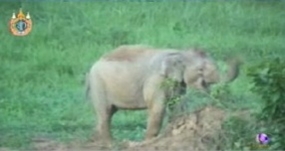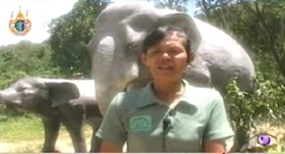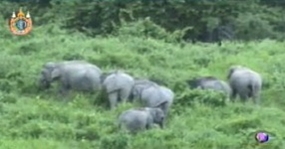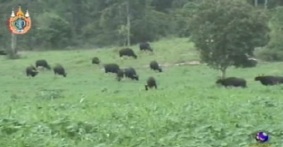The problem of forest encroachment has caused wild elephants to leave their jungle habitat and search for food in villagers’ farmlands.
In Kui Buri district of Prachuap Khiri Khan province, southwest of Bangkok, such problems have been tackled and the Kui Buri forest has become a pilot project of balanced living between the human community and nature.

The man-made forest invasion doesn’t only cause the elephants to come out to feed on villagers’ crops in towns, but also causes them to be killed in various ways such as being shot, poisoned, and burned on flaming pyres of rubber tyres.
One of solutions to help the survival of the pachyderms included setting up clubs and associations of local residents and related parties such as the Kui Buri Wild Elephant Conservation Association and the Ban Ruam Thai Ecotourism Club.
Such groups followed His Majesty King Bhumibol’s project on wild elephants in the area, which later became the King’s wild elephants foundation aiming to look after animals and the Kui Buri forest.

The foundation is an example of a successful story of tackling the violence between humans and wild elephants, and of the conservation of forest and the animals.
Nucharee Wangsra, a member of the local clubs responsible for the wild elephants, said some local residents in the past disliked the elephants as they destroyed their produce. But after the King’s project and the work of the associations took effect, the living conditions of the large mammals have much improved.

The elephants no longer come out of the jungle, while on the other hand, the local residents are able to gain extra income by bringing tourists to see the life of the elephants and other wild animals in the jungle.
“We have made dams to provide water and sources of food and minerals for animals. The outcome has been very positive. Elephants don’t come out of the jungle and destroy villagers’ crops anymore, as they can have abundant sources of food and water there,” Nucharee said.

Such methods have been conducted for about a decade, resulting in the fact that the Kui Buri forest has become resourceful. In the past, there used to be only 80 wild elephants living there, but now the number has increased to about 270, let alone another 60 bulls, and some other wild animals.
Thanks to the solved problem, the Kui Buri forest has become the country’s examplar demonstrating how the livelihood of animals and humankind can be compatible for both communities, and was dubbed as ‘Kui Buri, Thailand’s Safari’.





